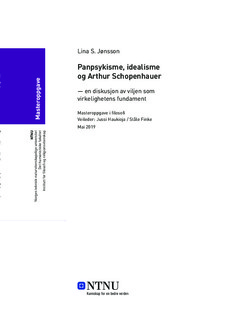| dc.description.abstract | In this thesis, I discuss consciousness oriented views on the mind body problem from the viewpoint of Arthur Schopenhauer's philosophy of the world as will and representation. I will show that his system indeed can be classified as both panpsychism and idealism, given his epistemological idealism and the interpretation of the fundamental will as a kind of consciousness+. I will also argue that idealism is the more preferable solution over panpsychism to the mind body problem, simply because it is, in its monism, the most economical. The main problem with idealism is, on the other hand, the presumed consequence of denying the reality of the outer world in itself, but I will show that this is not the case. Through Schopenhauer, I give an account of an intelligible «realistic idealism», on the basis of the will as equivalent to a kind of consciousness.
However, «will» in the Schopenhauerian sense is not directly interchangeable with «consciousness». This raises the problem of the difficulty in discerning the actual ontological status of the fundamental will, as the concept of «will» to begin with is both intentional and subjective. But this, as I show, is only an interpretation of the will on an organism level and not the fundamental level of reality, a conceptual distinction I make between o-will and f-will respectively. What the f-will is then, being the intrinsic nature of all phenomena, is not directly and transparently accessible to us. However, if we can agree to a certain degree of noumenalism, which I argue is a consequence of the will being fundamental to all reality, then a Schopenhauerian monistic view is an alternative worth exploring in answering the mind body problem.
One crucial result of the analysis of Schopenhauer's philosophy relevant to the problem, is therefore the impossibility of the qualitative notion of consciousness being fundamental to reality. Instead, if we are to agree with my interpretation of him, non-subjective consciousness must be at a more fundamental level than phenomenal consciousness for it to be part of the ontological foundation of the world. Or, more plausibly, panpsychism and idealism must yield in favor of a sort of neutral monism, which Schopenhauer's philosophy most correctly can be described as. | |
